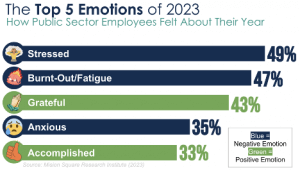It’s Time to Lead (Mindfully) in the Public Sector

Caitlyn Alford is a first-generation college graduate of the University of North Carolina at Chapel Hill with a Bachelor of Science in Psychology and a minor in Neuroscience. She earned her M.A. in Industrial-Organizational Psychology at Meredith College in Raleigh, North Carolina. Since 2019, Caitlyn has been leveraging her expertise as a manager and talent management consultant at Catching Leadership, where she specializes in organizational change, leadership development, visual creativity, and promoting mindfulness in the workplace. Her dedication to fostering growth and innovation within organizations allows her to help clients navigate today’s ever-evolving business landscape.
Michael Leytem has been a leadership coach and talent management consultant since 2011. He has worked with thousands of organizational leaders to customize talent strategies and leadership solutions that drive personal and organizational growth. As a published academic, with an M.A. in Industrial-Organizational Psychology, Michael has studied the mental processes and social pressures that influence effective leadership. His life-long passion for leadership, psychology, and mindfulness transcends throughout his work and interactions with others. Michael brings over 13 years of leadership coaching and management consulting experience to the corporate events he hosts.
In the modern era of work where stress, burnout, and fatigue are occurring at unprecedented levels, the need for mindful leadership has never been more obvious. Recent research shows that workplace well-being continues to be an ascending priority for organizations with no end in sight (APA’s Work in America Survey, 2023). Let’s talk about why mindful leadership is needed now more than ever, and explore its monumental impact on organizational success.
The Top 5 Emotions Public Sector Employees Felt Last Year
If you don’t think that workplace well-being is a pressing issue– just ask public sector employees. According to a report by Rivka Liss-Levinson, PhD and Gerald Young of MissionSquare Research Institute (2023), the top emotions public sector workers reported experiencing in the past year were:
- Stressed (49%) – Negative Emotion
- Burnt-Out/Fatigue (47%) – Negative Emotion
- Grateful (43%) – Positive Emotion
- Anxious (35%) – Negative Emotion
- Accomplished (33%) – Positive Emotion

The variety of positive and negative emotions felt by workers encapsulates the nuances within the changing landscape of the modern-day workplace. According to APA’s 2023 Work in America survey, employees in nonprofit and government organizations reported a higher prevalence of toxic workplace environments compared to their counterparts in the private sector (25% nonprofit & 26% government vs. 17% private). This disparity reinforces the need for effective leadership strategies to cultivate a positive and well-balanced workplace culture.
Why Is Mindfulness So Important Nowadays?
In today’s grossly overstimulated world, distractions are making it infinitely more difficult to maintain focus and establish well-being. The immediate need for mindfulness is crystal clear, just check out the decline in attention spans and surplus of tech-induced dopamine addictions.
Attention spans are dwindling, and have officially hit a record low. For context, the average attention on a screen was measured to be 2½ minutes back in 2004. With the more recent increase in cell phone usage, people can only pay attention to one screen for an average of 47 seconds (Mark, 2023). Individuals are seriously struggling to detach from their devices. As a matter of fact, technology is overriding our hard-wired needs for security and social Interaction. A whopping 89% of college students report feeling “phantom” phone vibrations, imagining their phone is summoning them to attention when it hasn’t actually buzzed (Drouin et al., 2012).
To paint the picture even further, the sheer pursuit of dopamine spikes through social media is physically impacting our brains. The average American picks up their phone 144 times a day, and 89% of Americans check their phones within 10 minutes of waking (Kerai, 2023). The repetitive dopamine release from social media creates a brain deficit, reducing an individual’s pleasure when not engaging in social media (Macit et al., 2018). The overstimulation causes individuals to experience understimulation in other aspects of their life. Mindfulness is the great equalizer in this modern-day battle for our mental health.


Mindfulness is about awareness and the ability to notice new things about your environment.
CAITLYN ALFORD & MICHAEL LEYTEM
What is Mindful Leadership?
According to the “Mother of Mindfulness” Dr. Ellen Langer, mindfulness is about awareness and the ability to notice new things about your environment. A mindful leader is capable of being “fully present” which can be interpreted differently in a variety of theories. Some traits of a mindful leader according to Walker et al. (2017), include the demonstrated ability to value open relationships among its employees, and the ability to make others feel not only heard, but also respected. A mindful leader creates a working environment that is supportive of new ideas and each individual’s ethical values.
Founder of the Institute for Mindful Leadership, Janice Marturano, defines a mindful leader as one who prioritizes clarity, innovation, creativity, and compassion throughout their leadership style. Wells (2015) believes that mindful leaders differ from classic leadership theories in which mindful leaders offer an essence of “presence, a subtlety of describing how leaders enact these traits by ways of being.” At its core, mindful leadership begins by managing yourself first, both inside and outside the workplace.
The Impact of Mindful Leadership
A multi-source study has shown that mindful leadership is an important precursor of authentic leadership behavior in organizations (Nübold et al., 2019). The research revealed that interventions aimed at enhancing mindfulness led to increased authentic leadership, as observed by both followers and leaders. This intervention positively influenced followers’ work attitudes. This research suggests that not only do leaders play a pivotal role in the workplace, but their mindfulness has a ripple effect throughout their organization. The consistent practice of mindfulness enhances a leader’s authenticity by aligning their intentions, words, and actions, leading to a more genuine and trustworthy leadership style that others readily recognize and appreciate. A mindful leader is perceived as an authentic leader, and this has the power to entirely shape work culture by inspiring similar qualities in followers.
By prioritizing holistic health and well-being, mindful leaders have the power to influence organizational strategies by fostering an open, innovative, and psychologically safe culture. They not only set a positive example for those they lead, but they also encourage work behaviors that strongly align with purpose-driven goals. Mindful leadership drives an organization to profitable results, particularly with regard to productivity levels due to their ability to delegate tasks that resonate with employees’ passions and values. Through the curation of belonging and empowerment amongst individuals, mindful leaders promote lower rates of turnover (Walker, 2017).
It’s Time to Lead the Way, Mindfully
The importance of mindful leadership cannot be overstated in today’s interconnected society. For leaders and organizations seeking guidance on mindful leadership practices, connecting with consulting and coaching services specializing in mindful leadership can be instrumental. By investing in customized leadership development efforts, organizations can empower their workforce and create a sustainable impact.
Connect with our team at Catching Leadership to kickstart your organization’s mindful leadership journey. Leadership, psychology, and mindfulness are at the core of everything we do at Catching Leadership. Visit www.catchingleadership.com to learn about all of the ways we can help public agencies cultivate more mindful leaders.
You can strengthen your leadership ability in a mindful way starting today. Check out our latest book, Keep Your Head In The Wind – a short, yet powerful read that offers timeless advice on how to address the deeply-rooted challenges leaders face. This book provides ancient wisdom, thought-provoking practices, and brief lessons to help readers cultivate inner peace, holistic perspectives, and a deeper sense of purpose.
Want new articles before they get published? Subscribe to our Awesome Newsletter.

CAREER ADVICE

GOV TALK




